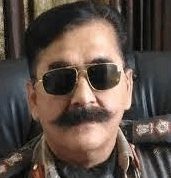Chinese stapled visa Issue

‘The art of diplomacy is to take an opportunity and turn it into something’—Brent Scowcroft.
The sub-continent of ours is always on a heightened trend of events wrought by actions sometimes within our control and others not so owing to factors extraneous. The latest Chinese needling of India on issuance of ‘Stapled visas ‘to the ‘Wushu’ players belonging to the state of Arunachal Pradesh who were headed to partake in ‘World university games’ that began in Chengdu has once again brought to the fore the ever-tenuous relations between the two Asian giants. It has been the wont of Chinese to indulge in these routine innuendoes and revisit them at crucial junctures of this region’s Geo-political unfolding with regional ramifications of considerable value. But deeper behind casting such innuendoes is the brazen Chinese attempt to undermine the ‘Comprehensive national power’ (CNP) of a throbbing country backed by its massive armed forces, an industrial infra that mocks the best of the economies of the world and an alive population to its rights that will not cancel its remit of shining under the hard work put in by crores of its denizens. The fact that PRC (People’s Republic of china) has been indulging in such activities has to be seen in the light of the fact that it can rattle very easily the world’s largest democracy with much ado and get away too, notwithstanding India’s protestations.
It has not been the first time that such Chinese misdemeanors have bedeviled our already fractured diplomatic and mutual ties ,which obviously have been under tremendous stress post June 2020 Galwan clash in eastern Ladakh. By questioning the visit of India’s Wushu team belonging to Arunachal Pradesh at Chengdu, Chinese have put into motion time and again its oft repeated stance of claiming Arunachal Pradesh as part of Southern Tibet which as per them India has been illegally in occupation since centuries.
India withdrew the whole ‘Wushu’ (martial art) squad from the world university games, which got underway on 28th July 2023 in Chengdu, in protest over China’s decision to give stapled visas rather than stamped ones to the three athletes from Arunachal Pradesh.
According to coach Raghvendra Singh, the decision was made hours after airport officials in New Delhi stopped an 8 person group of 5 athletes, a coach, and 2 support personnel at the boarding gate minutes before departure on Thursday night at midnight. Generally when you go abroad, the immigration officer puts a stamp on your passport so that it can be known why you are visiting that country.
But in the case of stapled visa, the stamp is put on an additional paper instead of the passport of the traveller. This additional paper contains all the details of the traveller including the details related to the trip of the stapled visa holder/traveller.
Stapled visa is issued by many countries like Cuba, Iran,Syria and N Korea. These countries used to issue staples visas to the citizens of China and Vietnam, but after a mutual agreement between these coun tries, this process was stopped. China purposefully issues stapled visas to the citizens of two Indian states/UTs i.e. Arunachal Pradesh and Jammu & Kashmir but does not apply the same formula for other Indian states. According to china, citizens of Arunachal Pradesh do not require any visas since they are part of china and do not require any permission to visit their own country, but since the area is still under Indian occupation hence the need to provide a stapled visa. It is a rule that when the stapled visa holder passenger (such as an Arunachal resident) returns to his home country after completing his work in china his stapled visa, entry and exit pass are torn off. The passport of the person travelling does not record any details of this trip which creates a security challenge for the administration of a country like India. A stapled visa does not leave a permanent trace on one’s passport. If china leaves a permanent mark on Arunachal Pradesh or J&K resident’s passport it simply implies that China accepts the residents of these two states/UT as territory of India which goes against its very stated position since decades. Equally it is a challenge for a country like India to negate the stated position of an enemy country that considers the land of an independent country as its own territory.
A country opposes the issuance of a stapled visa because the visa issuing country may conspire against the country whose citizens are getting the stapled visa and thus may lose its raison de etre in those areas which are contested. The message from the Chinese foreign ministry for the people of Arunachal Pradesh as also of Jammu and Kashmir is as follow:
‘Since the Indian government keeps an eye on your foreign visits and after checking your passport the government of India may come to know the details of your trips to china. So the Indian government may ask you to explain the reason for your trip to china. Hence the Chinese government has decided to issue a stapled visa to you’
In summary of the above paragraph it can be safely concluded that the stapled visa policy of china is a conspiracy to invite anti-India elements into their country and conspire with the strategy to divide united India. Having written so is China confining itself to its evil machinations to this activity only? It is a big NO. China has in fact denied recently visas to the Kailash Mansarovar yatra pilgrims too who are of Indian origin and were all set to resume this epoch journey from Nepal. Since 2019 this KM Yatra has been in a limbo for some or the other reason ranging from Galwan crisis to the pandemic of corona. Very well knowing the fact that this yatra reigns supreme in the collective conscience of majority population of India, China has granted the rights of undertaking this epoch pilgrimage from Nepalese side only to non-Indians and instead put additional restrictions on visa for Indian pilgrims thereby excluding the majority faith of this country to undertake this religious journey once in their life time.
The above Chinese actions tantamount to infringement of mutual understanding and the so called CBMs (confidence building measures) undertaken by the two Asian giants in 1993. By this action of theirs, China has in fact nullified the humongous Indian efforts put in by the country way back in May 2020 when our defence minister inaugurated the 80 km long road from Dharchula to Lipulekh pass to help facilitate easy approach to the KM Yatra by the pilgrims. It is a different matter that India has been able to circumvent the Chinese machinations by identifying a peak (old Lipulekh peak) which has a direct line of sight of about 50 kms as crow flies to the holy mountain of Mt Kailash in Tibetan autonomous region within our own geographical limits. But is that enough to emasculate evil Chinese designs to stymie Indian efforts of resurgence? There could be many checks and measures that could be initiated by India to put caution in the way china is acting to undermine our being. Some of the slated measures that India could undertake to blunt the Chinese hegemony could be —–
* To invoke an identical system of grant of stapled visas to the Chinese nationals who are residing in HongKong /Macau but desirous of visiting India for a variety of reasons. Taking the cue from ‘One country two systems’ which was a constitutional principle of the People’s Republic of china describing the governance of the special administrative regions of Hong Kong &Macau India can replicate the same to tie down china.
* In the similar vein grant all Tibetans stapled visas for their visit to our country.
* Adopting a multipronged approach, India could advertise the world over the discovery of a new peak (old lipulekh ) from where the KM Yatris could have a good view of Mt Kailash thereby blunting the Chinese efforts of denial of visas for Indian pilgrims to pay obeisance at Lord Shiva’s abode.
* Conducting Indo-Tibetan games at national level and giving an adequate heft to the same via RFA (Radio free Asia) stationed at Washington.
* By undertaking calibrated moves take the Tibetan jinn out of the closet of Indian psyche and start portraying them as an effective countervailing force to our northern neighbour.
It is well understood that in matters concerning the CNP/Comprehensive national power ‘One size fits all’ can’t be the guiding principle, thus necessitating tweaking of all levers of power at our command so as to project CNP as per our country’s size and prestige. China by repeatedly issuing stapled visas has a sinister design to cut short our CNP as well as our sovereignty. That calls for the highest levels of engagement on all fronts. Some of the above stated points could act as a catalyst towards that direction. As has been rightly said by Brent Scowcraft-‘The art of diplomacy is to take an opportunity and turn it into something’.
(The writer is a retired army officer)




